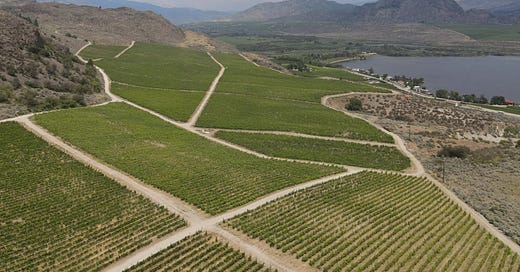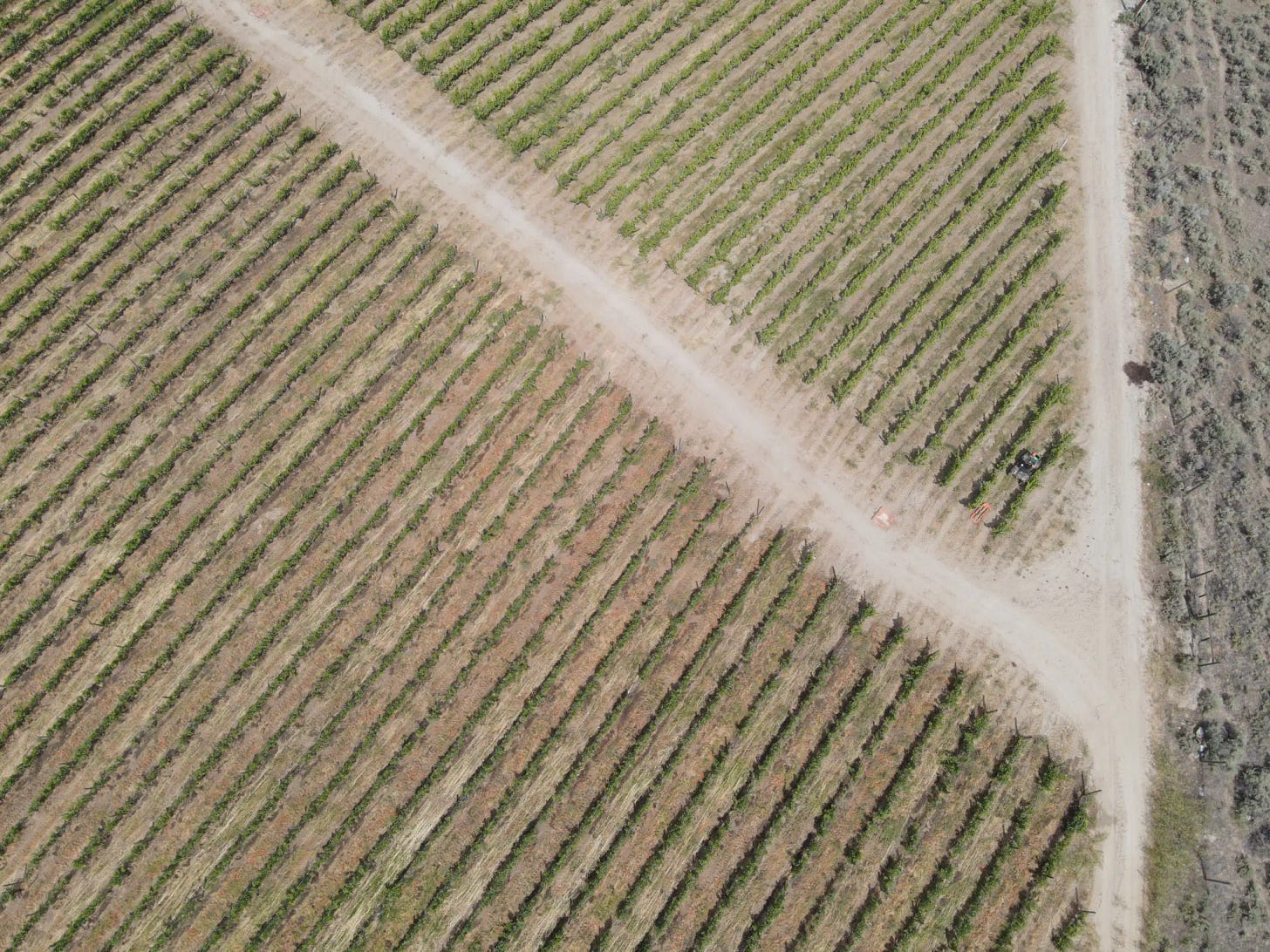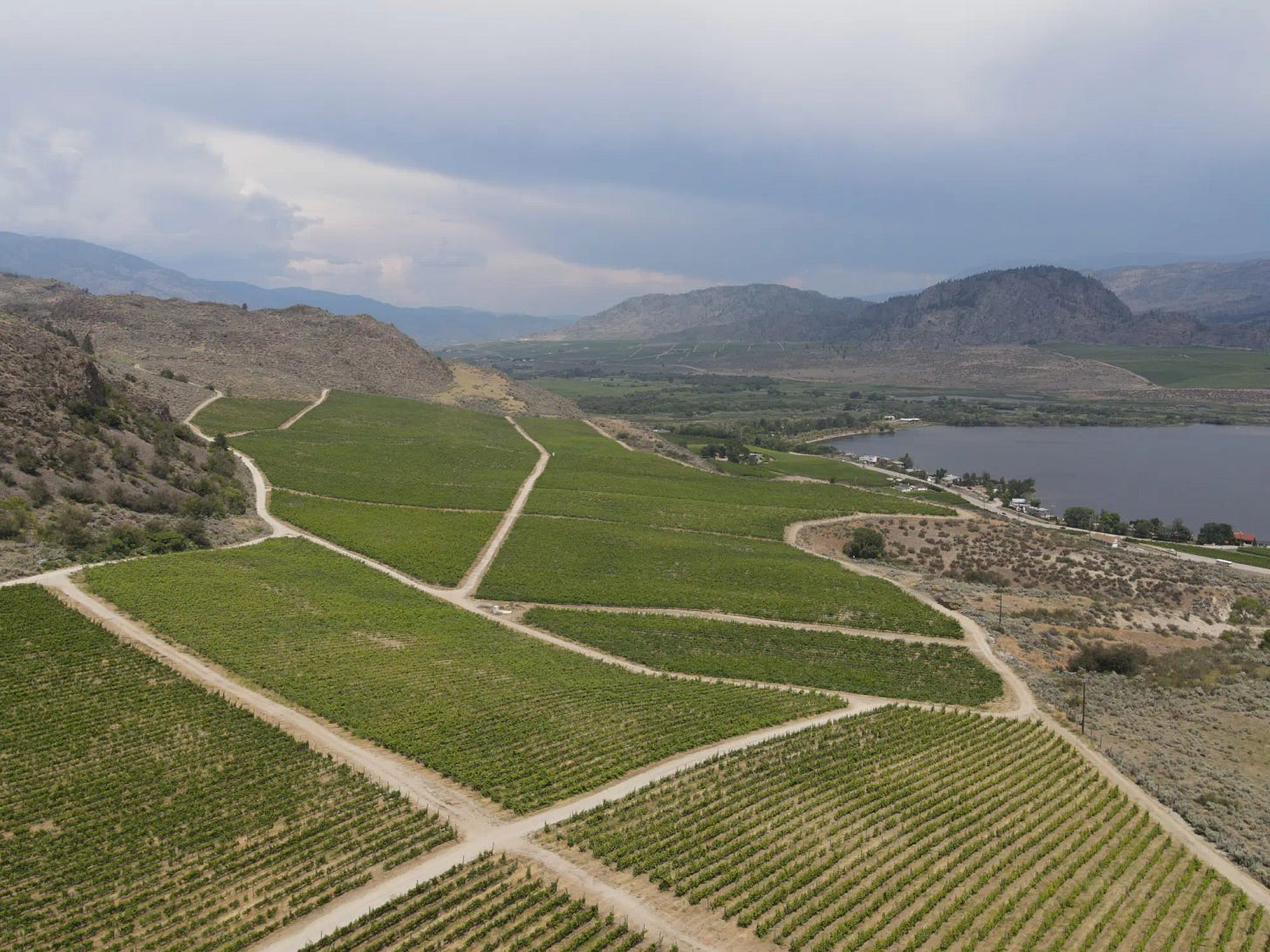A Love Letter of Hard Truths, by Michael Kullman
We need to have an honest conversation or we'll set our industry back decades.
[Editor’s Note: I’m always very excited to give voice to others in this newsletter/Substack. Today, we’re sharing a piece by Michael Kullman of Osoyoos Larose. Agree or disagree with his arguments, it’s a discussion we need to have.]
by Michael Kullman, General Manager at Osoyoos LaRose
This is a love letter to the Okanagan Valley and the amazing people who work here. I love this beautiful and unique region that we are lucky to call home. But we need to have an honest conversation about our future. We are at a crossroads and the decisions we make over the next 6-12 months will have major ramifications. This open letter is a step into the conversation on the state of the industry, and I would love to hear peoples’ thoughts and suggestions.
Two successive winter frosts, mixed with recent fires, have brought the swift rise of the Okanagan to an abrupt halt. In the face of these crises, two camps have formed to face the crisis within the Okanagan Valley - on one side winegrowers and on the other side wineries, both consumed by their own interests. It is imperative that we work together and even reach out to the other industries affected in the Valley. We need to present a unified front to the government, our customers, and the broader public. Unfortunately, the solutions put forward at recent townhall meetings have been erratic and frankly inadequate - if not downright damaging to our nascent industry.
The main solution put forward in the recent WGBC townhall was to bring in grapes from other regions, give them the VQA markup rebate, share the same shelf space in liquor stores and Save-On-Foods, and even create a new VQA for them. This is all seems great, no?
Step back and ask - why does Ontario have such a large surplus of grapes they’re willing to sell to us? Why does Washington?
It’s a pipe dream to think you can control the quantity of non-Okanagan wines allowed in the valley. How do you do so? An average over the last 5 years? How do you make sure the wineries do not keep the wine and blend it into VQA Okanagan wine later? How do you control how much they buy and from where? We can be adults here and admit that some wineries will magically move cheap Washington wine from their Washington tanks to increase the amount of higher-margin BC VQA wines.
How do you control the quality? Very few wineries and winemakers have experience with growers south of the border. While Washington produces some excellent wines, at their scale there is much low-quality fruit as well. Further, those looking to sell north of the border are less likely to be high-quality Washington producers. We have no quality guarantee.
And the VQA rebate payment? How can we support wine growers in Washington and not winegrowers in the valley? BC taxpayers want to support their own, not our friends south of the border, and BC winegrowers will justifiably be up in arms.
And then shelf space in the BCLS and Save-on-Foods? The shelf space must be kept for VQA Okanagan wines. If not, the effect will be huge on VQA wines as the wines coming in will be cheaper and will undercut the existing wines. You cannot keep the same brand of merlot or chardonnay and just remove the VQA Okanagan label and expect to be treated the same way. For the consumer, what then makes VQA special? Even with supposed “truth in labelling” the consumer and journalists will not forgive us.
Do we even care about sustainability in BC? How is buying grapes from across the border and trucking them 4-6 hours sustainable? How is not supporting your long term partners sustainable?
Once the large wineries have become acclimatized to those cheap grapes, they will never be going back, and the knock on effect will be huge on vineyards and wineries across the Valley. We will be opening up a pandoras box for the big players to swoop in and hoover up cheap grapes with the associated rebate payments. There will be no incentive to continue investing in viticulture in the valley and trying to make increasingly better wines.
Another VQA such has VQA Canada is just “Cellared in Canada”, repackaged.
We cannot embrace a race to the bottom: Buying grapes from Washington will force wineries to focus more on cost rather than quality. It will be a race to the bottom for the cheapest wines. And we know who will win that race. We have built so much, to then take a major step back by importing grapes, which will reduce our market potential even further.
Speak to Ontario grape growers and they will explain what happened when they let foreign grapes in. Foreign grapes came flooding in, imports were stockpiled, consumers were confused, and temporary changes became permanent and accepted norms. Wineries no longer bought domestic because the fruit was cheaper from abroad and Ontario consumers were no longer willing to pay more for Ontario wines. The very concept of “Ontario wine” was heavily devalued. And these “temporary measures” enforced by government were then made permanent. Ontario winegrowers will tell you they are still suffering two decades later.
However, if you are a land-based winery and would like to buy international grapes, be my guest. I support this option. But you should only be able to sell in your tasting room, wine club, or in the Cellared in Canada section and you should not get the rebate payment.
What is the solution? There is no easy solution, and the Government will not fund a replant, but we can use this crisis to create real meaningful change. We need to imitate the financially successful wine regions. Focus on viticulture, sub-appellations, production requirements, estate vineyards, and creating long tasting relationships between growers and wineries. We also need to focus on the unsexy work of systems that support wine production – like overhauling insurance, inter-provincial trade barriers, and creating real research and education partnerships with UBC. The Von Mandel Wine Research Institute has a nice ring to it, no?
There is no escaping the sad truth that some wineries will be forced to liquidate over the next 2 years. But we should not destroy decades of hard work and future economic potential to prop up poor business decisions. Well-run wineries should be able to adapt and survive these next 2-3 years. Buy grapes from outside the valley for your tasting rooms and wine clubs to keep them open and focus on high margin channels. Is it time we move away from 10-15 SKUs per winery, which confuses consumers and imposes high production costs?
Any government assistance must be aimed at the entire valley and not just at wineries. Vineyards, wineries, tree fruits, and our supply chains have all been hit and we need a valley-wide economic recovery plan.
Thankfully, there exists a vehicle to transfer government help quickly and smoothly to wineries and growers for crop loss and vine damage. Not increasing insurance help in 2024 would surely spell the end of crop insuranc[DM1] e. The payouts for insurance are small because the people paying in are few and there has not been a concerted industry effort to update the insurance system. We need to incentivize people to pay in and not punish those who have been doing their due diligence and practicing good governance.
We need to focus on the realities of farming, and this means working hard to revamp programs such as crop insurance and AgriStability. We need to significantly increase insurance payouts for vineyards and wineries. Perhaps we need to do so by increasing payouts for the age of vineyards to encourage replanting with climate-appropriate varieties (climate appropriate does not necessarily mean frost resistant, extreme summer temperatures are more likely to be the norm rather than extreme cold in the winter). This means not just paying out based on farm gate but also some percentage of revenue for wineries.
From a political and public relations point of view, increased crop insurance payouts is far more palatable than subsidizing foreign wine growers, or handing cash over to wineries. We’ve all heard public criticisms about rich people building castles on farms. And there is truth in that criticism.
We require strong leadership and a dose of hard truth. The Valley will come out stronger from this only if we make tough choices and with a solution that works for both growers and wineries. We have an opportunity to restructure the valley and make our vineyards more resilient to climate change, and by extension, our industry. If we do not support our growers and estate vineyards, we will continue to see decreasing yields and will be setting ourselves up for failure. Vineyards and viticulture cannot be an afterthought.
The reality is that problems facing the industry pre-date the frost events of 2022 and 2023. The tasting rooms have been emptying, wine clubs shrinking, and wine is going unsold in tanks. Tourism has been declining in the interior across the board. With ever increasing prices, BC consumers are no longer paying more for Okanagan wines and the way to win them back is not to use their taxes to subsidize Washington and Ontario grape growers. The consumers will see right through us and our dream of exporting outside of BC and Canada will be shot. From this we will never recover.
The Valley has a bright future but only if we focus and support what makes this valley special: the terroir. What is terroir? Terroir is very simply the ability to point to where exactly the grapes come from and to the people who grew the grapes and made the wine. I struggle to see a winery doing a good job of marketing grapes that come from 300 km south of the border and where they never even set foot in the vineyard and know nothing about the growing regions.
And this will take real leadership. It will take us focusing on the intimate and fine-detailed work of winegrowing and wine selling. Most importantly, it will take us facing up to hard truths and we need to ask ourselves: why we did not see this coming and why have we not planned for this?







This is an outstanding commentary by Michael. Obviously a lot of careful thought went into it. I won’t touch on all his points but I will say that I strongly agree with his overall idea. It will be a grave error to abandon our land-based principles in favour of ‘quick fix’ ideas to prop up wineries that - as most of us suspect- are not economically sustainable. That would be pressing our foot on the accelerator in a race to the bottom.
I don’t know why, but with land-based wineries the LCRB abandoned its long history of moderation in liquor licensing. Instead they lowered the entry bar, and then left it entirely up to the open market to decide how many wineries there should be. That predictably led to a proliferation of small wineries and labels. Today the consumer is overwhelmed by the number of BC wines. Can you imagine going into a grocery store and having 300+ choices of milk?
But back to that point about the LCRB letting the market decide how many wineries there should be. Whether it was the right decision or wrong, what will compound the difficulties is to now disregard the market principle and instead take unwise steps to prop up failing wineries.
Let’s be clear: it was always going to come to this. BC chose the path of a wide open market for wineries. That means that a significant number of enterprises will fail when economic forces turn against them, as they have now. That’s the nature of the open market. The weak will fail while the strong survive. You can’t have an open market without that reality, and trying to avoid it is throwing scarce resources at a losing proposition.
Lest I sound harsh or uncaring, I’d like to state straight up that I don’t know if my land-based winery will survive. Our industry has gone through five devastating years in a row, and I don’t see any bright lights on the horizon. But I’ve always been in this for the long haul, which requires working through the inevitable bad times wisely. I’m not in favour of ill-considered quick fixes, of which importing US grapes is top of the list. We need to work through this, smartly and like professionals, accepting that some will fall by the wayside while others come out stronger. That’s how we will build a long term viable industry.
Richard Roskell
Marichel Vineyard and Winery
In 1976/77 as an Agriculture Grad. student at UBC, we were tasked by Dr. George Eaton with selecting potential Vinifera varietals to replace Labrusca grapes being pulled up. Given long-term climate conditions, we recommended just a few hardy grapes, concerned specifically about outlier weather events. Over the years, as growing conditions improved, many new varietals were tested and introduced, but growers have known the peril all along. Part of the solution now is to field inspect vines, track their production for a few years as they recover, and replant as necessary those that have proven to be robust. Yes, the bubble has burst, but that is not the end for home-grown Okanagan wine production. VQA labelling should not be applied to any import grapes or wine.